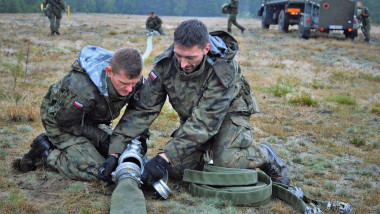European Warfighting Resilience and NATO Race of Logistics: Ensuring That Europe Has the Fuel It Needs to Fight the Next War
Submission Statement
NATO’s newly announced “defend every inch” policy will require massive investment into logistics and sustainment to come to fruition. Food, fuel, equipment, and soldiers will have to be moved from West to East in enormous quantities on extremely short notice. The war in Ukraine has shown the preparation of the networks and infrastructure required in peacetime is critical to their successful operation during a war. With this in mind, NATO has begun laying the foundations for a vastly increased commitment in Eastern Europe. This article from CSIS follows just one aspect of that commitment, the shortfalls in fuel supply to Eastern Europe. It notes that eastward fuel supplies have been neglected after the end of the Cold War, but that a number of countries have demonstrated a renewed interest in the issue in recent year. It also sets out a series of steps NATO planners can take in order to secure fuel logistics against a potential invasion: providing Ukraine with energy and logistical support, identifying strategic vulnerabilities in fuel supply and mitigating critical shortfalls, optimizing joint logistics on the eastern flank and fortifying frontline states, developing a resilient and adaptable NATO fuel infrastructure, enhancing intermediate-level operational logistics, prioritizing fuel support requirements and operational energy needs, exploring alternative operational energy solutions, and integrating collective and national energy resilience requirements.
Anna M. Dowd is an adjunct fellow (non-resident) with the Defense-Industrial Initiatives Group at the Center for Strategic and International Studies (CSIS) in Washington, D.C. Dominik P. Jankowski is a policy adviser in the Office of the NATO Secretary General. Cynthia R. Cook is the director of the Defense-Industrial Initiatives Group and a senior fellow in the International Security Program at CSIS.
The North Atlantic Treaty Organization’s (NATO) initial response to Russia’s brutal war against Ukraine signaled a commitment to strengthening deterrence and defense posture. Yet, the conflict highlighted capability gaps, readiness shortfalls and problem points across the alliance, including ever more contested logistics, vulnerable transport infrastructure, and growing energy insecurity. The need to meet these looming and often-overlooked challenges is acute. Left unchecked, they could weaken the alliance’s collective resilience and undercut efforts to provide continuous military support to Ukraine, stopping the military momentum on the ground from shifting decisively in its favor. One fundamental component of warfighting capability underpinning all others is operational energy broadly and fuel specifically, both in peacetime and wartime. Efforts to increase the readiness and enablement of NATO forces should therefore explicitly take into consideration the logistics implications and the compounding effects of rising logistics requirements, including fuel. Enhanced ability to operate in contested environments as well as maintaining forward defense on NATO’s eastern flank will result in higher fuel consumption and, in turn, will require a larger logistics footprint. Thus, increasing operations energy capabilities, including storage and distribution, and reducing risks associated with the lack of or dependence on vulnerable supply lines are critical supporting capabilities for the future fight.
This war demonstrates that meeting wartime demands in a large-scale conflict benefits from prior peacetime investments and clearly defined targets, as well as from better integration of logistics into strategic planning. Military planning for NATO collective defense can take insights from the current conflict and ensure that these considerations are part of the implementation for the deter and defense strategy and the decisions to conduct geographically specific regional plans, as well as functional strategic subordinate plans (SSPs)—in particular, the SSP for enablement. The urgency to solve real problems at scale through adapting and improving fuel supply logistics is not only fundamental to building capacity along Europe’s eastern flank to address Russia’s military threat but also to an expanded U.S. force posture that requires sustained access. Effective logistics across national borders will depend on the integrated effect of every ally. The Vilnius summit offers the alliance leaders the opportunity to collaborate on an approach to identify challenges and to resolve logistics burden-sharing. A comprehensive approach including a NATO Resilience Planning Process and adequate investments would bolster collective resilience in Europe. Ensuring that Europe has the fuel it needs to fight the next war could usefully be the first application of this approach.

Add comment